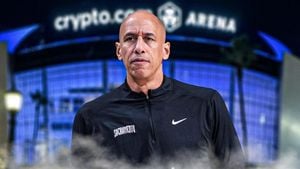Luigi Mangione, the 26-year-old accused of murdering UnitedHealthcare CEO Brian Thompson, is now on track to raise nearly $500,000 for his legal defense. The outpouring of support, primarily through online crowdfunding, highlights the intersection of legal issues and public sentiment toward the healthcare industry.
On December 4, 2024, Mangione allegedly gunned down Thompson outside of his Manhattan hotel as he made his way to UnitedHealth Group's annual investor meeting. Following the shooting, Mangione fled to Altoona, Pennsylvania, where he was arrested on December 9 after authorities spotted him at a local McDonald's. During his arrest, police found him with a firearm, suppressor, mask, and ID links him to the homicide, solidifying the case against him.
Since his arraignment, Mangione has garnered immense public interest and support, resulting in significant financial backing for his defense. According to the December 4 Legal Committee, which launched the fundraiser on GiveSendGo, donations have surged beyond $300,000, well above the initial goal of $250,000. The 10,000-plus contributors to this fund have expressed both admiration and frustration toward the current healthcare system, contributing to what many are portraying as Mangione's status as something of a folk hero.
“Luigi is aware of the fund and very much appreciates the outpouring of support,” stated his attorney, Karen Friedman Agnifilo. “My client plans on utilizing it to fight all three of the unprecedented cases against him.” The legal team has reflected on how the contributions will assist Mangione amid the weighty charges he faces, which include multiple counts of murder—specifically as acts of terrorism.
Sam Beard, spokesperson for the December 4 Legal Committee, remarked, “We’re thrilled Luigi is accepting these funds so he can mount the strongest defense possible.” Beard pointed out the growing frustrations within the public concerning the private insurance industry, citing, “The American private health insurance industry has ruined countless lives by denying people access to basic care and burying families in medical debt.” This perspective resonates strongly with many donors, some of whom have echoed sentiments on platforms supporting Mangione.
Many who contributed anonymously to the fund expressed their declarations of loyalty to Mangione's cause. One supporter passionately asserted, “Evil only thrives when good men see it and do nothing about it.” Another proclaimed their resolve for change, claiming, “Eat the rich! Socialism is the only way!” These declarations reveal the depth of emotion tied to Mangione's allegations and the broader commentary on insurance companies.
Despite his supporters’ fervor, Mangione’s case is serious. He was charged with numerous felonies, including first-degree murder, and remains currently detained at Brooklyn’s Metropolitan Detention Center as he fights multiple legal battles. He faces both state and federal charges stemming from the fatal incident involving Thompson.
Public opinion, as represented through various media channels, reveals deep-seated frustrations about healthcare practices and the ramifications of systemic issues. A recent poll showed most Americans believe the person who committed the shooting shares culpability, yet many sympathize with Mangione's actions as protests against healthcare corporations. The words “delay,” “deny,” and “depose” were reportedly scrawled on the casings found at the crime scene—terms often associated with the practices of insurance companies when allegations of denial or neglect arise.
Legal defense efforts are still underway, as Mangione’s upcoming court dates loom, with the next proceeding scheduled for February 21. Mangione has pleaded not guilty to the charges against him and continues to enjoy support from within his growing base. His influential background, having attended Ivy League institutions funded by his family, juxtaposed against the circumstances surrounding his alleged crime have created considerable intrigue and controversy.
It's unclear how this support might impact both public perception and his legal trials, but Mangione’s burgeoning following certainly serves as one indication of the wider discontent surrounding the American healthcare system. Many have championed him as a symbol of resistance against alleged corporate greed, reflecting the frustrations felt by millions across the nation.
While the legal ramifications of Mangione’s actions loom ominously, the funds raised signal continued support from those who feel empowered to confront established norms through grassroots movements. The defense team's ability to utilize this backing may prove pivotal as the case against Mangione progresses, especially as it highlights the intersections of criminal justice, public sentiment, and systemic issues within healthcare.



